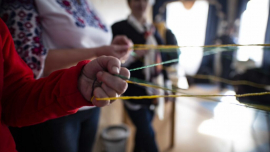Sexual violence during the war: how Swiss NGOs help Ukrainians to recover
Since the beginning of Russia's war against Ukraine in February, reports of sexual violence began to circulate. Sexual violence as a military tactic is prohibited by international humanitarian law but it is a horrific outcome that continues to occur undated during war.
According to the latest UN count, since February more than 120 reports of sexual violence have been collected, although the true number may be higher.
The UN has received reports of rape, gang rape, coercion, and people being forced to witness partner or child abuse.
From afar and in the background, humanitarian groups and civil society based in Switzerland did what they could to support the survivors.
On the ground in Switzerland.
Switzerland has accepted more than 60 thousand Ukrainian refugees and expects this number to double by the end of the year, SwissInfo reports. On the ground, the Swiss Red Cross is providing resources and psychosocial support to Ukrainian refugees through a new digital platform and its cantonal branches.
For the first time, the Swiss Red Cross has also created a brochure and accompanying posters, aimed at women and children arriving in Switzerland. Its message is loud and clear: "Protect yourself from threats, exploitation and violence". Both are available for free online download in Ukrainian, German, French, and Russian and have QR codes leading to organizations supporting migrant women, victims of trafficking or domestic violence, as well as medical resources. Both materials were placed in shelter seekers' reception centers throughout Switzerland and in the offices of the Swiss Red Cross.
"We've already received several phone calls saying they need more brochures," Hildegard Hungerbühler, author of the brochures and posters, told Geneva Solutions.
The Swiss Red Cross mobilized as quickly as possible when the wave of Ukrainian refugees reached Switzerland. After committing to preventing and responding to sexual and gender-based violence (SGBV) internationally in December 2019, the organization has been working to provide concrete assistance to survivors. The new brochures and posters are aimed at helping women who have suffered from violence or exploitation, whether in Ukraine, on their journey away from war, or in Switzerland.
Reopening old wounds
The current war is not the first time that Ukrainians have faced unimaginable violence, although this time the rest of the world has been more willing to help. The eyes of the world were on Ukraine during this invasion. But when Russia invaded eastern Donbas in 2014, there was much less visibility.
A study released in June by the Geneva-based Global Survivors Fund (GSF) describes conflict-related sexual violence in Ukraine from 2014 to the present. Founded in 2019 by Nobel Peace Prize laureates Dr. Denis Mukwege and Nadia Murad, a survivor herself, the foundation uses a survivor-centered approach to make reparations available worldwide.
During the presentation of the study, numerous Ukrainian survivors shared their stories.
"For me, the war began in 2014 in Donbas," said Maryna Chuikova, a survivor and member of Survivors to End Sexual Violence in War (SEMA) Ukraine. Chuikova was helping the Ukrainian army and was detained, tortured, and later sexually assaulted.
Another victim, Iryna Dovhan, said: "It hurts me to be a witness. We spoke, but few people heard us in 2014. It's a huge wound for us, and it's terrible that we had to shed so much blood to be heard now."
A current board member of GSF, Dovgan was similarly arrested and detained for supporting the Ukrainian army, and subsequently subjected to abuse. In 2018, she became the national coordinator of the Global Network of Victims and Survivors of Sexual Violence in Ukraine (SEMA) and now heads the Ukrainian Network of Survivors.
The way to reparations
The greater focus on the conflict in 2022 has already meant a greater push for reparations. At a July accountability conference in Ukraine, a priority was to focus on reparations for victims of sexual violence. "Reports from Ukraine included credible accounts of the widespread use of sexual violence as a weapon of war. Particular attention should be paid to effectively addressing such allegations while ensuring that all survivors receive the necessary support," the conference notes read.
The GSF's survey of victims showed that in the short term, victims are most in need of medical care, psychological support, and social services. The foundation's work is based on the idea that survivors should also be able to decide for themselves what compensation means. In Ukraine, victims from 2014 to 2021 demanded long-term compensation, such as restitution, compensation, rehabilitation, and guarantees of non-recurrence.
"We are really trying to change the paradigm. Reparations tend to come later. People mistakenly assume that you have to wait until the conflict is over or the trial is over," said Danae van der Straten Pontchoz, Head of Advocacy and Policy at GSF. "Reparations are urgent, and you don't have to wait for the conflict to end to start providing reparations. In fact, you can avoid irreparable harm if you act quickly."
GSF has signed a memorandum of understanding with the Ukrainian government and will provide technical support in the creation of a nationwide framework for interim reparations. Moving quickly to compensate victims of sexual violence has the potential to set a new global precedent.
"The Ukrainian government is very eager to start this process," said Maya Shah, GSF's Chief Operating Officer. "We need to see this translate into concrete action now."





